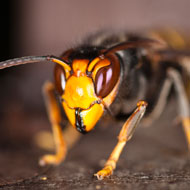
Nest identified and destroyed in Gloucestershire
An outbreak of Asian hornets in south west England has been contained after bee inspectors found and destroyed a nest in Gloucestershire.
The invasive hornet poses no greater risk to human health than a bee, but is a significant threat to honey bee colonies. The species was first spotted in Tetbury, Gloucestershire, in September this year.
A three-mile surveillance zone was imposed in Gloucestershire and Somerset and bee inspectors scoured the area, using infrared cameras and traps.
Defra confirmed in a statement that the nest was treated with pesticide and removed in early October. No further hornets have been seen since.
Two dead Asian hornets were found in separate locations in north Somerset, but no nests or live hornets were found by inspectors. Defra says there have been no further sightings.
Worker Asian hornets cannot survive in cold weather so they will die as winter set in. However, Defra will remain vigilant, working closely with the National Bee Unit and its nationwide network of bee inspectors, as well as other partners.
Asian hornets arrived in France in 2004 and are now common in large parts of Europe. It is possible the species could reappear in England next year and Defra is urging members of the public to report any suspected sightings.
For advice on what to do if you believe you have seen an Asian hornet, visit: http://www.nonnativespecies.org/alerts/index.cfm?id=4
Image by Danel Solabarrieta/CC BY-SA 2.0



 The BSAVA has opened submissions for the BSAVA Clinical Research Abstracts 2026.
The BSAVA has opened submissions for the BSAVA Clinical Research Abstracts 2026.